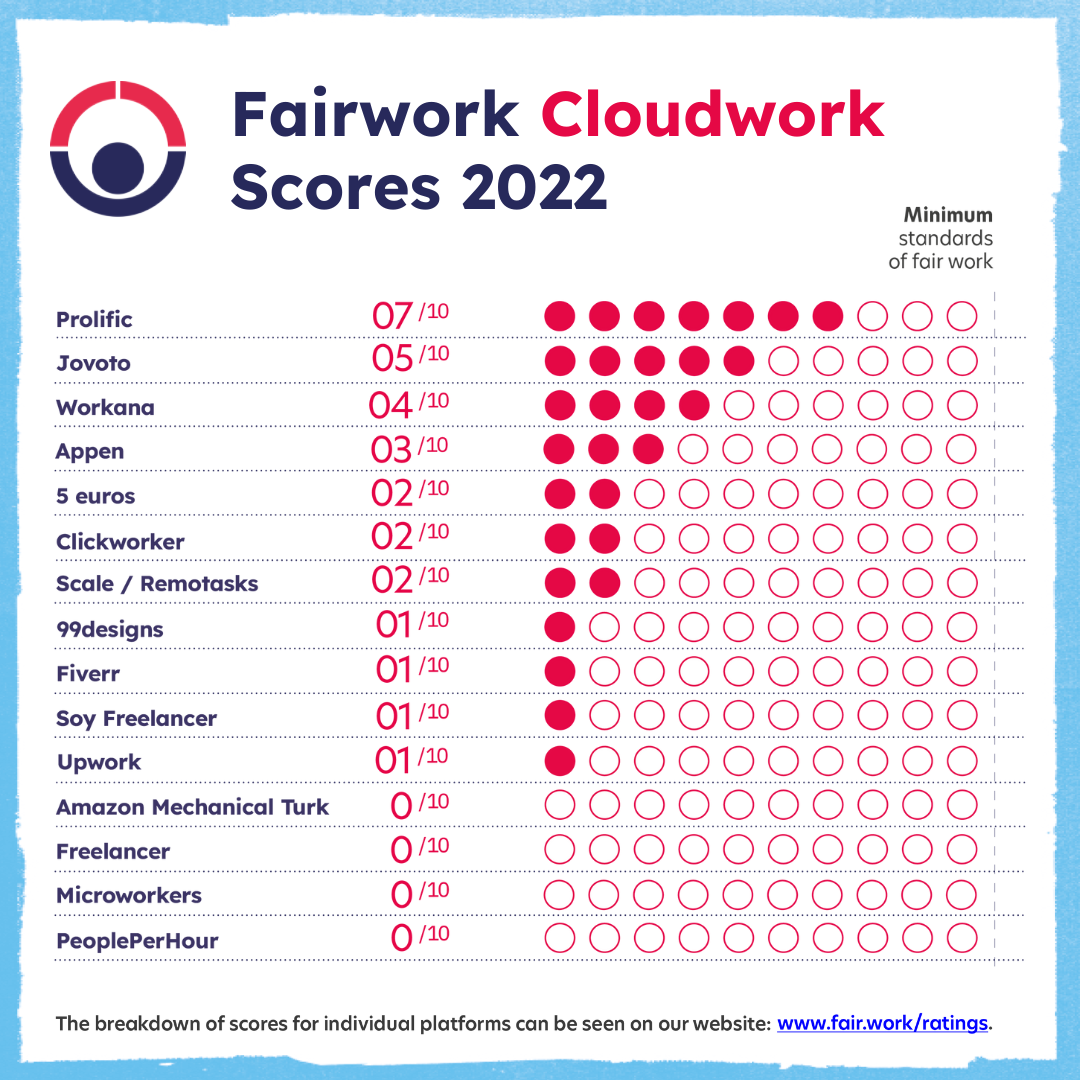New Fairwork Cloudwork ratings expose the precarious working conditions of online work platforms

The Fairwork Cloudwork Report 2022 assesses and scores basic standards of fairness in working arrangements on 15 online remote digital labour platforms, according to our five Fairwork principles — pay, conditions, contracts, management, and representation.
As global connectively has expanded, online remote platforms increasingly present an alternative for workers, especially those marginalised from standard work or who lost their jobs as a result of the COVID-19 Pandemic. The size of the workforce is difficult to estimate. Previous research put the online workforce at around 163 million in 2020, although this number could be higher due to the limits on measurement attempts. The ILO mapped 283 “web-based platforms” in its 2021 Work Employment Outlook, comprising 181 freelance platforms, 46 dedicated to microtasks, 37 based on content creation and circulation, and 19 focused on competitive programming.
Although this labour market has come to be described as “planetary” because of the scale on which it operates, it is nonetheless shaped by a number of geographic features, such as language, time zone, and internet access. Thus, regional inequalities play a substantial role in the shaping of working relations. Fierce competition between workers, largely from the global south, for work commissioned largely in the global north, through platforms operating in traditional power centres such as the US results, in substantial precarity and, as many workers claim, discrimination based on Geography.
Ratings
This report presents the second set of Fairwork ratings for cloudwork platforms. It scores Prolific, Jovoto, Workana, Appen, 5 euros, Clickworker, Scale / Remotasks, 99designs, Fiverr, Soy Freelancer, Upwork, Amazon Mechanical Turk, Freelancer, Microworkers, and PeoplePerHour.
In general, platforms are still not close to safeguarding the basic standards of fair work expressed in our five principles. One platform scored seven points out of 10, one scored five, and one scored four. For the other 12 platforms, we were unable to evidence that they met more than three of our ten thresholds. For four platforms, we could not find evidence that they met any threshold.

Key findings
Fair Pay: Only four platforms, Prolific, SoyFreelancer, 5 Euros and Upwork, were able to evidence that they had systems in place to ensure that workers were paid in a timely manner for all the work they completed. No platform achieved a point for ensuring the local minimum wage.
Fair Conditions: Six platforms (5 Euros, Appen, Jovoto, Prolific, Scale/Remotasks, and Workana) were awarded the first point because they evidenced measures to avoid unreasonable levels of competition between workers, and overwork. Out of the six platforms awarded the first point, five received an additional point for showing that health and safety risks are mitigated.
Fair Contracts: Only two platforms, Prolific and Fiverr, were awarded the first point, related to the availability of clear terms and conditions. Of the two platforms that received a point for 3.1, only Prolific was awarded an additional point for this threshold because its contracts were consistent with the workers’ terms of engagement on the platform.
Fair Management: We were able to evidence that seven platforms (99designs, Appen, Clickworker, Jovoto, Prolific, Scale/ Remotasks, Workana) met all our criteria for the first point – there is due process for decisions affecting workers. Of the seven platforms that achieved this, three received an additional point for because we found equity in the management process.
Fair Representation: Two platforms, Clickworker and Jovoto, were awarded a point for fair representation, related to the recognition of and engagement with collective workers’ bodies. Unfortunately, we were unable to award the second point (there is collective governance or bargaining) to any of the platform evaluated this year.
The Fairwork Pledge
As part of Fairwork’s commitment to making platforms accountable for their practices, we created the Fairwork Pledge. The pledge aims to encourage other organisations to support best labour practices, guided by the five principles of fair work.
Organisations like universities, schools, businesses, and charities who make use of platform labour can make a difference by supporting the best labour practices, guided by our five principles of fair work. You have the option to sign up to the Pledge as an official Fairwork Supporter or an official Fairwork Partner. Those signing up to be a Supporter must demonstrate their support for fairer platform work publicly and provide their staff with appropriate resources to make informed decisions in their supply chains. Becoming a Fairwork Partner entails making a public commitment to implement changes in their own practices, such as committing to using better-rated platforms when there is a choice.